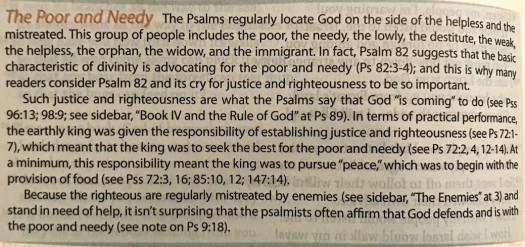I’ve been so swamped at work these past few weeks that I got behind, again. So I adjusted the schedule, again. But, it’s my schedule, so it’s all good.
Job 25: We see Bildad’s very short third response here. He seems to be arguing that God is simply too important and great to be questioned by Job. Bildad does directly ask Job “How can a person be innocent before God” (25:4), seeming to challenge Job’s earlier arguments that he has done nothing wrong. Still sticking to their arguments.
Job 26: It’s interesting to note that according to the notes in the NRSV, even though the text itself refers to Job as responding in this chapter, the thought is that this chapter is still part of Bildad’s speech. See p. 751 for more discussion on this.
Job (or Bildad, need to research this more) initially mocks his friend and then discusses the power that God holds, listing several examples of his creation. Instead of describing each one I’m going to put them here. This is from the CEB study bible (26:7-14):
7 He stretched the North over chaos,
hung earth over nothing;
8 wrapped up water in his clouds,
yet they didn’t burst out below;
9 hid the face of the full moon,
spreading his cloud over it;
10 traced a circle on the water’s surface,
at the limit of light and darkness.
11 Heaven’s pillars shook,
terrified by his blast.
12 By his power he stilled the Sea;
split Rahab with his cleverness.
13 Due to his wind, heaven became clear;
his hand split the fleeing serpent.
14 Look, these are only the outer fringe of his ways;
we hear only a whispered word about him.
Who can understand his thunderous power?
There’s a lot of science in there. All really interesting stuff. The text ends with a question implying that there’s just no way a human could ever understand the level of God’s power. Again, seeming to argue that it’s ridiculous for humans to ever question God, which I fundamentally disagree.
Job 27: Again, the notes in the NRSV version are interesting. As are the notes in the CEB version. Both indicate that there is some disagreement on if Job actually said these things in this chapter or was it someone else. Apparently there’s speculation that this chapter could actually be Zophar’s missing speech, since in the current text he doesn’t have a third speech.
The start in this chapter is interesting. Job declares a solemn pledge to God that he will not give up his integrity and admit to any wrongdoing. He actually flat out blames God for his current predicament: “As God lives, who rejected my legal claim, the Almighty, who made me bitter…” (27:2).
Job then moves on to curse his enemies. The notes in the CEB study bible argue that he is possibly cursing his friends. I wondered about that. Has his relationship with his friends changed so much during this discussion that he would consider them his enemies?
Job ends this chapter with a pretty gruesome description of what will happen to his enemies as well as their children should they have any. Just wow!
Psalm 82: A shorter psalm that describes an apparent disagreement between God and those on the divine council. He accuses them of “granting favor to the wicked” (82:2) and not helping those in most need. He curses them and tells them that they will all die like the mortals. Damn! Declare your strength.
I want to include a picture of a sidebar here about this psalm and that God is typically on the side of those who are in most need (from page 932 OT in CEB Study Bible). I wonder if our elected leaders realize this? Probably not.

Psalm 83: This is a communal prayer for help. The psalmist then lists 10 groups of people who want to destroy Israel. The psalmist then goes into the request: they want God to destroy these people. They give different examples of things they hope God will do to their enemies: fire, storms, hurricanes, wind, etc. All natural events. Kinda interesting.
Psalm 84: This psalm is referred to as a “song of Zion.” It’s a really pleasant psalm that focuses on the temple and the joy the temple brought to the psalmist. It sounds like the temple was a place of comfort and safety for them.
Psalm 85: This is another communal prayer, this time asking God for forgiveness like he did with previous generations. Not much else to report. It’s another nice read.
